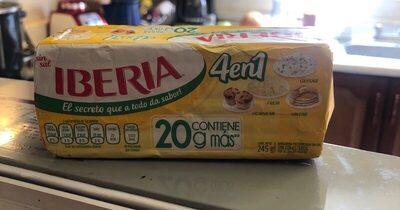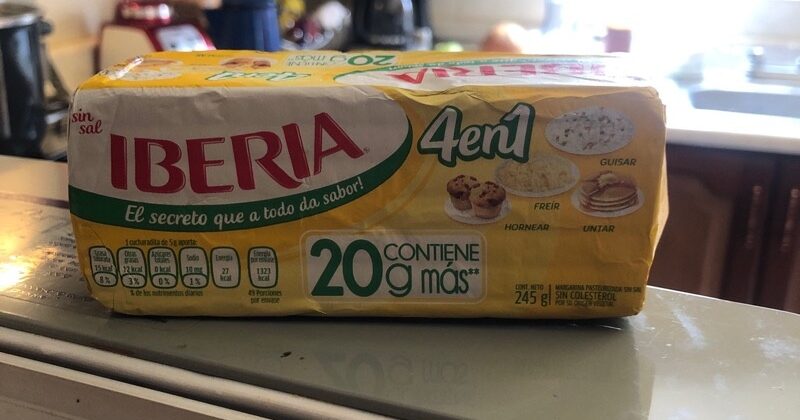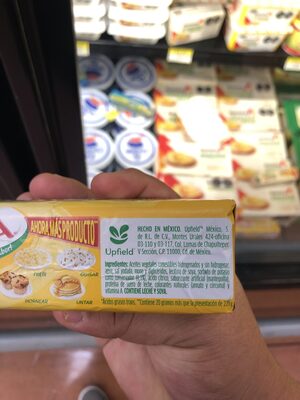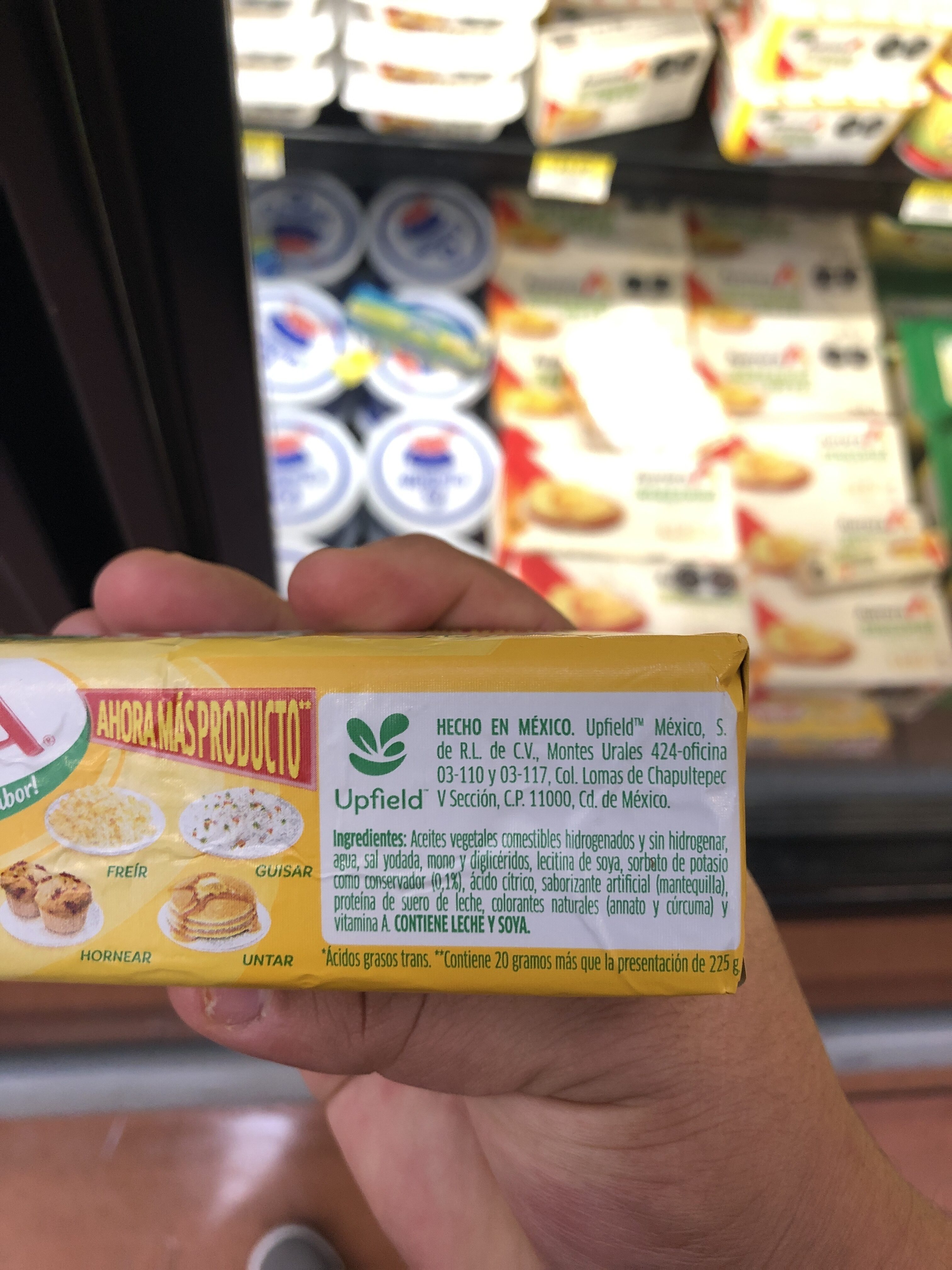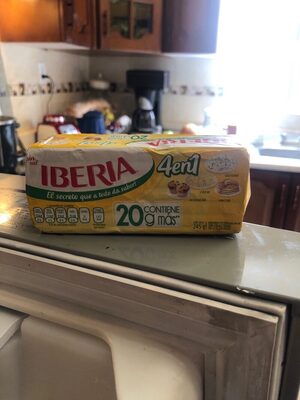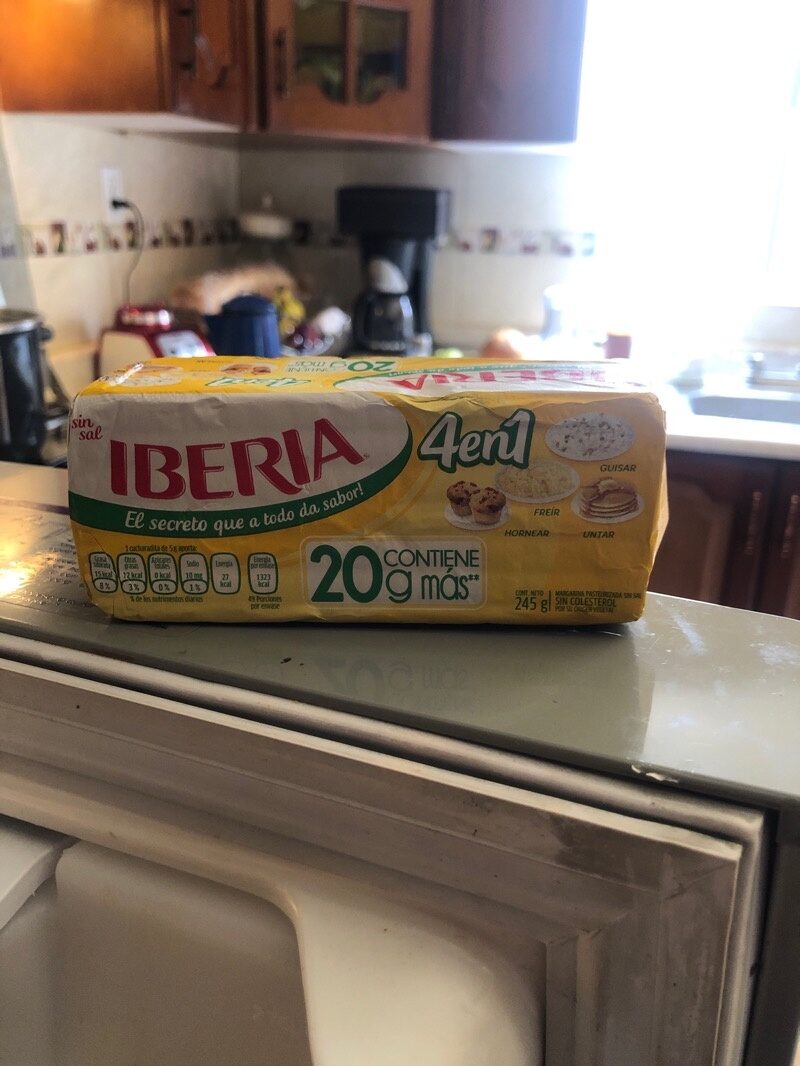Help us make food transparency the norm!
As a non-profit organization, we depend on your donations to continue informing consumers around the world about what they eat.
The food revolution starts with you!
Margarina sin sal 4 en 1 - iberia - 245 g
Margarina sin sal 4 en 1 - iberia - 245 g
This product page is not complete. You can help to complete it by editing it and adding more data from the photos we have, or by taking more photos using the app for Android or iPhone/iPad. Thank you!
×
Barcode: 8719200450059 (EAN / EAN-13)
Quantity: 245 g
Packaging: Paper
Brands: Iberia
Categories: Plant-based foods and beverages, Plant-based foods, Fats, Spreads, Plant-based spreads, Salted spreads, Spreadable fats, Vegetable fats, Margarines
Labels, certifications, awards: es:Margarina Pasteurizada sin Sal
Origin of ingredients: Mexico
Manufacturing or processing places: Hecho en México
Link to the product page on the official site of the producer: https://upfield.com/
Countries where sold: Spain
Matching with your preferences
Health
Ingredients
-
18 ingredients
: Aceites vegetales comestibles hidrogenados y sin hidrogenar, agua, sal yodada, mono y diglicéridos, lecitina de soya, Sorbato de potasio como conservador (0,1%), ácído citrico, saborizante artificial (mantequilla), proteina de suero de leche, colorantes naturales (annato y cúrcuma) y vitamina A. CONTIENE LECHÉ Y SOYA. FREÍR GUISAR HORNEAR ';Ácidos grasos trans. ';Contiene 20 gramos más que la presentación de 225 g UNTARAllergens: Milk, Soybeans
Food processing
-
Ultra processed foods
Elements that indicate the product is in the 4 - Ultra processed food and drink products group:
- Additive: E160b - Annatto
- Additive: E322 - Lecithins
- Ingredient: Colour
- Ingredient: Flavouring
- Ingredient: Milk proteins
Food products are classified into 4 groups according to their degree of processing:
- Unprocessed or minimally processed foods
- Processed culinary ingredients
- Processed foods
- Ultra processed foods
The determination of the group is based on the category of the product and on the ingredients it contains.
Additives
-
E202 - Potassium sorbate
Potassium sorbate (E202) is a synthetic food preservative commonly used to extend the shelf life of various food products.
It works by inhibiting the growth of molds, yeast, and some bacteria, preventing spoilage. When added to foods, it helps maintain their freshness and quality.
Some studies have shown that when combined with nitrites, potassium sorbate have genotoxic activity in vitro. However, potassium sorbate is generally recognized as safe (GRAS) by regulatory authorities.
-
E322 - Lecithins
Lecithins are natural compounds commonly used in the food industry as emulsifiers and stabilizers.
Extracted from sources like soybeans and eggs, lecithins consist of phospholipids that enhance the mixing of oil and water, ensuring smooth textures in various products like chocolates, dressings, and baked goods.
They do not present any known health risks.
-
E322i - Lecithin
Lecithins are natural compounds commonly used in the food industry as emulsifiers and stabilizers.
Extracted from sources like soybeans and eggs, lecithins consist of phospholipids that enhance the mixing of oil and water, ensuring smooth textures in various products like chocolates, dressings, and baked goods.
They do not present any known health risks.
-
E330 - Citric acid
Citric acid is a natural organic acid found in citrus fruits such as lemons, oranges, and limes.
It is widely used in the food industry as a flavor enhancer, acidulant, and preservative due to its tart and refreshing taste.
Citric acid is safe for consumption when used in moderation and is considered a generally recognized as safe (GRAS) food additive by regulatory agencies worldwide.
-
E570 - Fatty acids
Fatty acid: In chemistry, particularly in biochemistry, a fatty acid is a carboxylic acid with a long aliphatic chain, which is either saturated or unsaturated. Most naturally occurring fatty acids have an unbranched chain of an even number of carbon atoms, from 4 to 28. Fatty acids are usually not found per se in organisms, but instead as three main classes of esters: triglycerides, phospholipids, and cholesterol esters. In any of these forms, fatty acids are both important dietary sources of fuel for animals and they are important structural components for cells.Source: Wikipedia
Ingredients analysis
-
Palm oil content unknown
Unrecognized ingredients: es:aceites-vegetales-comestibles-hidrogenados-y-sin-hidrogenar, es:mono-y-digliceridos, es:sorbato-de-potasio-como-conservador, es:freir-guisar-hornear, es:acidos-grasos-trans, es:contiene-20-gramos-mas-que-la-presentacion-de-225-g-untarSome ingredients could not be recognized.
We need your help!
You can help us recognize more ingredients and better analyze the list of ingredients for this product and others:
- Edit this product page to correct spelling mistakes in the ingredients list, and/or to remove ingredients in other languages and sentences that are not related to the ingredients.
- Add new entries, synonyms or translations to our multilingual lists of ingredients, ingredient processing methods, and labels.
If you would like to help, join the #ingredients channel on our Slack discussion space and/or learn about ingredients analysis on our wiki. Thank you!
-
Non-vegan
Non-vegan ingredients: Butter, Whey proteinSome ingredients could not be recognized.
We need your help!
You can help us recognize more ingredients and better analyze the list of ingredients for this product and others:
- Edit this product page to correct spelling mistakes in the ingredients list, and/or to remove ingredients in other languages and sentences that are not related to the ingredients.
- Add new entries, synonyms or translations to our multilingual lists of ingredients, ingredient processing methods, and labels.
If you would like to help, join the #ingredients channel on our Slack discussion space and/or learn about ingredients analysis on our wiki. Thank you!
-
Vegetarian status unknown
Unrecognized ingredients: es:aceites-vegetales-comestibles-hidrogenados-y-sin-hidrogenar, es:mono-y-digliceridos, es:sorbato-de-potasio-como-conservador, es:freir-guisar-hornear, es:acidos-grasos-trans, es:contiene-20-gramos-mas-que-la-presentacion-de-225-g-untarSome ingredients could not be recognized.
We need your help!
You can help us recognize more ingredients and better analyze the list of ingredients for this product and others:
- Edit this product page to correct spelling mistakes in the ingredients list, and/or to remove ingredients in other languages and sentences that are not related to the ingredients.
- Add new entries, synonyms or translations to our multilingual lists of ingredients, ingredient processing methods, and labels.
If you would like to help, join the #ingredients channel on our Slack discussion space and/or learn about ingredients analysis on our wiki. Thank you!
-
Details of the analysis of the ingredients
We need your help!
Some ingredients could not be recognized.
We need your help!
You can help us recognize more ingredients and better analyze the list of ingredients for this product and others:
- Edit this product page to correct spelling mistakes in the ingredients list, and/or to remove ingredients in other languages and sentences that are not related to the ingredients.
- Add new entries, synonyms or translations to our multilingual lists of ingredients, ingredient processing methods, and labels.
If you would like to help, join the #ingredients channel on our Slack discussion space and/or learn about ingredients analysis on our wiki. Thank you!
: Aceites vegetales comestibles hidrogenados y sin hidrogenar, agua, sal yodada, mono- y diglicéridos, lecitina de soya, Sorbato de potasio como conservador 0.1%, ácído citrico, saborizante artificial (mantequilla), proteina de suero de leche, colorantes naturales (annato, cúrcuma), vitamina A, CONTIENE LECHÉ y SOYA, FREÍR GUISAR HORNEAR, Ácidos grasos trans, Contiene 20 gramos más que la presentación de 225 g UNTAR- Aceites vegetales comestibles hidrogenados y sin hidrogenar -> es:aceites-vegetales-comestibles-hidrogenados-y-sin-hidrogenar
- agua -> en:water - vegan: yes - vegetarian: yes - ciqual_food_code: 18066
- sal yodada -> en:iodised-salt - vegan: yes - vegetarian: yes - ciqual_food_code: 11058
- mono- y diglicéridos -> es:mono-y-digliceridos
- lecitina de soya -> en:soya-lecithin - vegan: yes - vegetarian: yes - ciqual_food_code: 42200
- Sorbato de potasio como conservador -> es:sorbato-de-potasio-como-conservador - percent: 0.1
- ácído citrico -> en:e330 - vegan: yes - vegetarian: yes
- saborizante artificial -> en:artificial-flavouring - vegan: maybe - vegetarian: maybe
- mantequilla -> en:butter - vegan: no - vegetarian: yes - ciqual_proxy_food_code: 16400
- proteina de suero de leche -> en:whey-protein - vegan: no - vegetarian: yes
- colorantes naturales -> en:natural-colours
- annato -> en:e160b - vegan: yes - vegetarian: yes
- cúrcuma -> en:turmeric - vegan: yes - vegetarian: yes - ciqual_proxy_food_code: 11089
- vitamina A -> en:vitamin-a - vegan: yes - vegetarian: yes
- CONTIENE LECHÉ y SOYA -> en:soy-milk - vegan: yes - vegetarian: yes
- FREÍR GUISAR HORNEAR -> es:freir-guisar-hornear
- Ácidos grasos trans -> es:acidos-grasos-trans
- Contiene 20 gramos más que la presentación de 225 g UNTAR -> es:contiene-20-gramos-mas-que-la-presentacion-de-225-g-untar
Nutrition
-
Missing data to compute the Nutri-Score
Missing nutrition facts
⚠ ️The nutrition facts of the product must be specified in order to compute the Nutri-Score.Could you add the information needed to compute the Nutri-Score? Add nutrition facts
-
Nutrient levels
-
Fat in high quantity (60.6%)
What you need to know- A high consumption of fat, especially saturated fats, can raise cholesterol, which increases the risk of heart diseases.
Recommendation: Limit the consumption of fat and saturated fat- Choose products with lower fat and saturated fat content.
-
Sugars in low quantity (0%)
What you need to know- A high consumption of sugar can cause weight gain and tooth decay. It also augments the risk of type 2 diabetes and cardio-vascular diseases.
Recommendation: Limit the consumption of sugar and sugary drinks- Sugary drinks (such as sodas, fruit beverages, and fruit juices and nectars) should be limited as much as possible (no more than 1 glass a day).
- Choose products with lower sugar content and reduce the consumption of products with added sugars.
-
Salt in low quantity (5e-13%)
What you need to know- A high consumption of salt (or sodium) can cause raised blood pressure, which can increase the risk of heart disease and stroke.
- Many people who have high blood pressure do not know it, as there are often no symptoms.
- Most people consume too much salt (on average 9 to 12 grams per day), around twice the recommended maximum level of intake.
Recommendation: Limit the consumption of salt and salted food- Reduce the quantity of salt used when cooking, and don't salt again at the table.
- Limit the consumption of salty snacks and choose products with lower salt content.
-
-
Nutrition facts
Nutrition facts As sold
for 100 g / 100 mlCompared to: Margarines Fat 60.6 g +3% Saturated fat ? Omega 3 fat 0 mg -100% Oleic acid 0 g Nervonic acid 0 g Carbohydrates ? Sugars 0 g -100% Maltose 0 g Starch 0 g Fiber 0 g -100% Proteins 0 g -100% Nucleotides 0 g Salt 0 g -100% Fruits‚ vegetables‚ nuts and rapeseed‚ walnut and olive oils (estimate from ingredients list analysis) 0 %
Environment
-
Eco-Score B - Low environmental impact
⚠ ️Select a country in order to include the full impact of transportation.The Eco-Score is an experimental score that summarizes the environmental impacts of food products.→ The Eco-Score was initially developped for France and it is being extended to other European countries. The Eco-Score formula is subject to change as it is regularly improved to make it more precise and better suited to each country.Life cycle analysis
-
Average impact of products of the same category: B (Score: 75/100)
Category: Vegetable fat (margarine type), spreadable, 50-63% fat, light, unsalted, rich in omega 3
Category: Vegetable fat (margarine type), spreadable, 50-63% fat, light, unsalted, rich in omega 3
- PEF environmental score: 0.31 (the lower the score, the lower the impact)
- including impact on climate change: 2.11 kg CO2 eq/kg of product
Stage Impact Agriculture
72.7 %Processing
9.4 %Packaging
4.9 %Transportation
9.1 %Distribution
3.0 %Consumption
0.8 %
Bonuses and maluses
-
Origins of ingredients with a high impact
Malus: -3
Environmental policy: -3
Transportation: 0
Origin of the product and/or its ingredients % of ingredients Impact Mexico 100 %High
-
Packaging with a low impact
Malus: -1
Shape Material Recycling Impact Unknown Paper Low ⚠ ️ The information about the packaging of this product is not sufficiently precise (exact shapes and materials of all components of the packaging).⚠ ️ For a more precise calculation of the Eco-Score, you can modify the product page and add them.
If you are the manufacturer of this product, you can send us the information with our free platform for producers.
Eco-Score for this product
-
Impact for this product: B (Score: 71/100)
Product: Margarina sin sal 4 en 1 - iberia - 245 g
Life cycle analysis score: 75
Sum of bonuses and maluses: -4
Final score: 71/100
-
Carbon footprint
-
Equal to driving 1.1 km in a petrol car
211 g CO² per 100g of product
The carbon emission figure comes from ADEME's Agribalyse database, for the category: Vegetable fat (margarine type), spreadable, 50-63% fat, light, unsalted, rich in omega 3 (Source: ADEME Agribalyse Database)
Stage Impact Agriculture
64.1 %Processing
10.0 %Packaging
8.5 %Transportation
15.3 %Distribution
1.8 %Consumption
0.3 %
Packaging
-
Packaging with a low impact
-
Packaging parts
(Paper)
-
Packaging materials
Material % Packaging weight Packaging weight per 100 g of product Paper or cardboard
-
Transportation
-
Origins of ingredients
Origins of ingredients with a high impact
Origin of the product and/or its ingredients % of ingredients Impact Mexico 100 %High
Report a problem
-
Incomplete or incorrect information?
Category, labels, ingredients, allergens, nutritional information, photos etc.
If the information does not match the information on the packaging, please complete or correct it. Open Food Facts is a collaborative database, and every contribution is useful for all.
Data sources
Product added on by elcoco
Last edit of product page on by packbot.
Product page also edited by elcoco.ee39e9eb04ec19be0a4c666d825c5b10, karlaherdez, musarana, openfoodfacts-contributors, org-app-elcoco, thaialagata.
